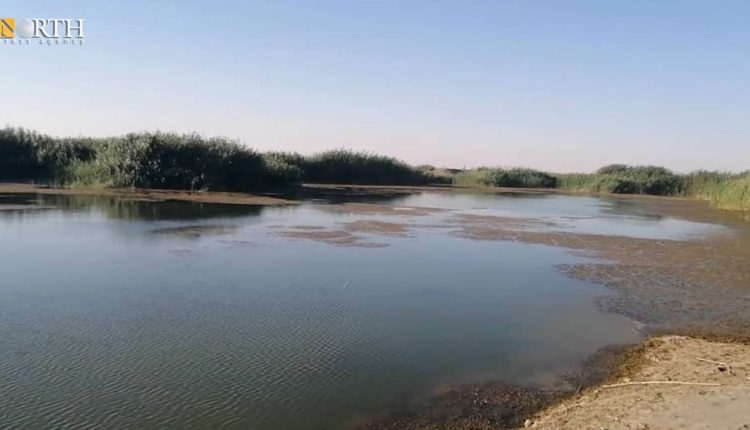
By Omar Abdurrahman
DEIR EZ-ZOR, Syria (North Press) – The smuggling of crude oil from areas controlled by the Syrian Democratic Forces (SDF) to territories held by the Syrian government and Iranian-backed militias endangers lives, harms livestock, and threatens the environment and the Euphrates River in eastern Syria.
The problem remains largely unmanageable, despite ongoing efforts to curb this illicit trade.
Recently, the banks of the Euphrates River in Deir ez-Zor Governorate in eastern Syria, have become hotspots for crude oil smuggling. Pipelines have been installed directly into the river, leading to severe water pollution.
This contamination adversely impacts the local residents who rely on the Euphrates for drinking water, sanitation, and irrigation.
Contaminated
Louay al-Ramadan, a resident from the town of Shaafah in eastern Deir ez-Zor, says that the leakage of oil into the Euphrates River is causing severe water contamination.
The diesel spills are affecting homes, drinking water, and food supplies. Despite their efforts to filter the water, the chemical residues from the diesel persist, leading to poisoning cases among both children and animals.
He points out that the effects of this pollution are not just limited to public health but also extend to the economic sector, where the price of diesel has risen dramatically due to increased smuggling operations.
He says that attempts to purify the water with chlorine and other chemicals have been ineffective due to the extent of the contamination.
The impact on public health is significant, affecting not only the local residents but also agricultural activities that rely on the river’s water.
He calls on responsible authorities to address and control the smuggling operations and to take measures to protect the Euphrates River from further pollution.
Threat
Abdul Razaq al-Fatah, a resident of the town of Diban, says he notices oil spots floating on the Euphrates River when he goes there to operate the irrigation pump for his orchards.
He highlights that this contamination is harmful to both people and trees, as the tainted water degrades the soil and jeopardizes plant health.
Al-Fatah also notes seeing dead fish on the water’s surface, signaling a severe environmental crisis.
He attributes the crude oil leakage to multiple factors, including the use of outdated hoses and tanks for smuggling operations, and the occasional burning of oil barrels in the river by military forces.
He stresses that immediate intervention by relevant authorities is crucial to halt the smuggling activities and address the contamination.
Al-Fatah emphasizes that the smuggling operations not only endanger the environment but also pose serious risks to local residents, including health hazards from smoke generated by burning oil during military raids and the dangers associated with armed clashes between smuggling groups and security forces.
Impacts
An agriculture engineer, Yaser al-Asker from Deir ez-Zor, highlights the persistent odor of the oil taints the water, making it unsuitable for consumption.
Al-Asker notes that separating the chemicals from the contaminated water is challenging due to the lack of advanced purification facilities, with current efforts relying solely on chlorine, which is insufficient for effective treatment.
He further explains that the toxic substances and contaminants from the oil damage crops and hinder plant growth, resulting in reduced agricultural yields. If the contamination levels increase, the soil will also be adversely affected, rendering the water undrinkable, he says.
He emphasizes it is crucial to tackle the smuggling operations to protect the river, safeguard residents’ health, and preserve agricultural productivity.
Counter measures
Muhammad al-Omar, an SDF leader in Deir ez-Zor, says that daily patrols are conducted along the Euphrates River to counteract smugglers who transport fuel from SDF-controlled areas to government-held territories for financial gain.
He emphasizes that smugglers disregard the serious risks associated with their activities, including threats to their own lives, potential harm to local residents, and damage to agricultural infrastructure due to fuel leaks into the river.
Al-Omar notes that recent efforts have intensified, with increased raids targeting smuggling operations. These measures have led to the seizure of substantial quantities of crude oil and the arrest of several smugglers, who are now facing trial for their offenses.
